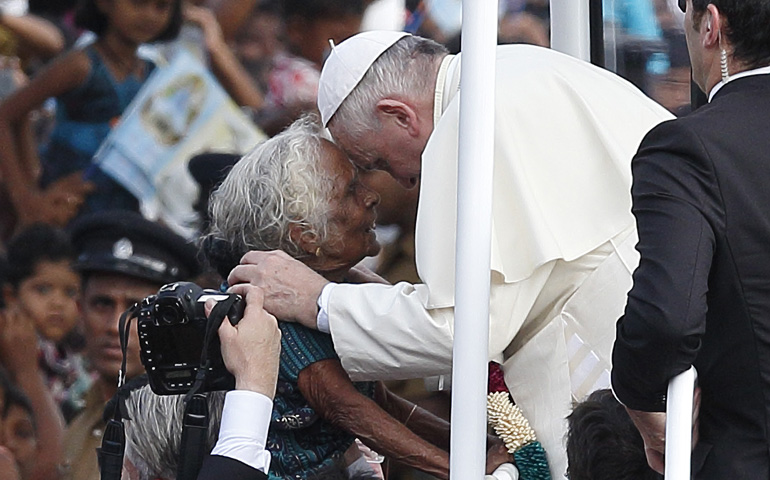
Pope Francis greets a woman as he arrives to pray Wednesday at the Sanctuary of Our Lady of the Rosary in Madhu, Sri Lanka. (CNS/Paul Haring)
After a day and half of speaking of the need for Sri Lankans to pursue deeper reconciliation efforts following their civil war, Pope Francis on Wednesday went to the area most affected by the 26-year conflict to deliver a delicate and difficult message.
Visiting a Marian shrine in Madhu, an area about 200 miles north of the island country's capital city, the pope told Sri Lankans they must acknowledge the pain, suffering, and even evil that had been perpetrated during the war.
Addressing a prayer to Mary, Francis said: "We also want to ask her to implore for us the grace of God’s mercy."
"We ask also for the grace to make reparation for our sins and for all the evil which this land has known," he continued.
"It is not easy to do this," Francis said. "Yet only when we come to understand, in the light of the cross, the evil we are capable of and have even been a part of, can we experience true remorse and true repentance."
"Only then can we receive the grace to approach one another in true contrition, offering and seeking true forgiveness," he said.
Our Lady of Madhu Shrine, where Francis spoke, was shelled several times during the 1983-2009 war and housed thousands of refugees intermittently over the period of the conflict.
The war, which is estimated to have claimed up to 100,000 lives, was fought between Sri Lanka's two primary ethnic groups: the Tamils and Sinhalese. The Tamils had sought to form an independent state in the northeastern part of the country, including the area where the Marian shrine is located.
Sri Lankan Chief Justice Mohan Peiris said in a brief interview Wednesday that one of the difficult parts in facilitating reconciliation between his people is to "approach the whole new process with a spirit of love, with a spirit of forgiveness, and [to] not show any rancor to anyone."
Sri Lankans, Peiris said, must "put the past behind us and to get on with the future in a spirit of accommodation."
However, some Sri Lankans are calling on the government to first investigate alleged crimes and atrocities committed during the war before pursuing reconciliation efforts.
While Sri Lanka's government undertook such a process over 18 months in 2010 and 2011, instituting a Lessons Learnt and Reconciliation Commission, the U.N. said the final report from that commission was inadequate and did not give accountability for alleged atrocities.
One Sri Lankan priest also criticized the commission in an interview, saying it did not go deep enough in its investigations.
The commission, said Fr. Jeyabalan Croos, did not work "because they were trying to push everything under the carpet, to cover up everything."
"For reconciliation, the people who have caused violations, they must acknowledge [it]," said Croos, who is from the area around Madhu and is involved in human rights advocacy. "There must be truth, which is accompanying reconciliation."
Francis himself made a call for truth-seeking about the war in the remarks he made when he landed in Sri Lanka Tuesday.
Addressing Sri Lanka's new president, Maithripala Sirisena, Francis said any process of reconciliation in the country "needs to include the pursuit of truth, not for the sake of opening old wounds, but rather as a necessary means of promoting justice, healing and unity."
Asked in a press conference Tuesday night whether Francis’ words on truth meant he supported the U.N.'s call for a new Sri Lankan truth commission, Vatican spokesman Jesuit Fr. Federico Lombardi said the pope wanted "a way of looking for truth that can bring people together."
Francis wants "a common awareness of what has happened ... [so that] you can go on to build reconciliation," Lombardi said.
Francis is visiting Sri Lanka in a two-part Asian voyage that will see him continue on to the Philippines on Thursday.
On Tuesday, the pope had a private state visit with Sirisena and took part in an interreligious meeting. On Wednesday morning, he led an outdoor Mass with some 500,000 in attendance to canonize Sri Lanka's first saint, 17th-century missionary Oratorian Fr. Joseph Vaz.
The pope's visit to the Marian shrine Wednesday was marked again by dense crowds of people seeking to meet him.
About 72 percent of Sri Lanka's approximately 21 million people are Buddhist. About 12 percent identify as Hindu, 9 percent as Muslim, and 7 percent as Christian.
Francis will return to Colombo later Wednesday afternoon. As he leaves Sri Lanka on Thursday morning, the pope will make a brief stop to pray at the Our Lady of Lanka shrine and to meet with 10 Jesuit priests living in the area.
The pope lands in the Philippine capital of Manila on Thursday afternoon but is not scheduled to make any more public speeches until a meeting with the country's president, Benigno Aquino III, and the country's diplomatic corps Friday morning.
[Joshua J. McElwee is NCR Vatican correspondent. His email address is jmcelwee@ncronline.org. Follow him on Twitter: @joshjmac.]




